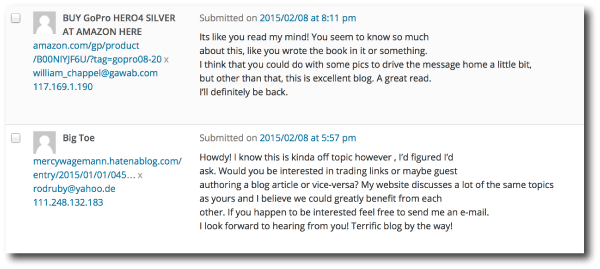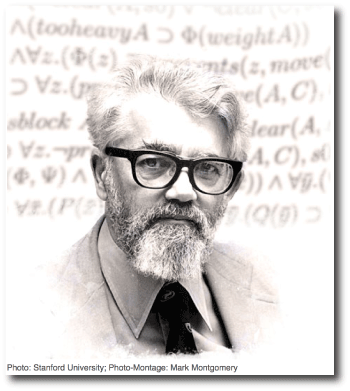In looking through oklo’s activity logs, it is evident that many of the visitors are not from the audience that I have in mind as I write the posts. The site is continually accessed from every corner of the planet by robots, harvesters, spamdexing scripts, and viral entities that attempt to lodge links into the blog.
A common strategy consists of attempts to ingratiate with generically vague comments of praise:
The Turing test was envisioned as a text-only conversation with a machine. The machine passes the test if it can’t be distinguished from a real person. In Alan Turning’s Computing Machinery and Intelligence, he asks, “Are there imaginable digital computers which could do well in the imitation game?”
For now, the general consensus seems to be no. Machines can’t consistently pass the test (and the test itself seems increasingly dated), but their moment is approaching fast. Judith Newman’s recent NYT article about interaction with the iPhone’s Siri telegraphs the stirrings of the current zeitgeist.
The economics of comment spam must be relatively minor. Were serious money was at stake, a Nice Post! robot armed with state-of-the-art-2015 natural language processing skills and tuned to the universe of text strings and facts could almost certainly pull the wool over my eyes.
In early 2001, I was working at NASA Ames Research Center. The first Internet Bubble hadn’t quite ended. Highway 101 was a near-continual traffic jam. Narrow billboard trucks advertising this or that dot com were still cycling aimlessly up and down the Peninsula. We had just published our plan to move the Earth in response to the gradually brightening Sun.
I got an e-mail with a stanford.edu address from someone named John McCarthy, who asked if he could come to NASA Ames to talk with us about astronomical engineering. This was before the Wikipedia, and for me, at least, before the ingrained reflex to turn to the web for information about someone one doesn’t know. I just wrote back, “Sure!”
I recall McCarthy in person as a rather singular character, with a bushy white beard surrounding thick black glasses. He had a rattletrap car with a bulky computer-like device somehow attached next to the steering wheel. My co-author, Don Korycansky, was there. I remember that the conversation was completely focused on the details of the orbits and the energy budgets that would be required. We didn’t engage in any of the far-out speculations or wide-eyed ramifications that thrust us, as a result of my ill-advised conversation with a reporter a few weeks later, into a terrifying worldwide media farce.
Only later did I realize that John McCarthy was one of the founding giants of computer science. He coined the term Artificial Intelligence, invented Lisp, and was famous for his Usenet .sig, “He who refuses to do arithmetic is doomed to talk nonsense.”
McCarthy’s Progress and Sustainability web pages (online at http://www-formal.stanford.edu/jmc/progress/index.html) are dedicated to the thesis of optimism — that human progress is desirable and sustainable. He wrote, “There are no apparent obstacles even to billion year sustainability.” In essence, the argument is that the Anthropocene epoch, which began at 05:29:21 MWT on July 16, 1945, will stretch to become an eon on par in duration with the Archean or the Proterozoic.
Optimistic is definitely the operative word. It’s also possible that the computational innovations that McCarthy had a hand in ushering in will consign the Anthropocene epoch to be the shortest — rather than one of the longest — periods in Earth’s geological history. Hazarding a guess, the Anthropocene might end not with the bang with which it began, but rather with the seemingly far more mundane moment when it is no longer possible to draw a distinction between the real visitors and the machine visitors to a web site.



